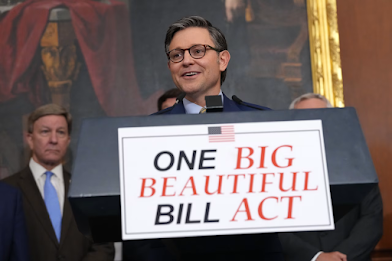Congress Sleeps Through an Economic
Wake-Up Call
The recent passage of the One Big Beautiful Bill Act shows a significant moment in American fiscal policy, with only two people coming out of the process with any real success. Speaker Mike Johnson showed excellent leadership skills in handling the difficult political situation, successfully managing a divided Republican group that holds only a small majority over a united Democratic opposition. Despite facing constant threats to his position for over eighteen months, Johnson successfully guided the legislation through Congress, showing remarkable political skill in balancing competing interests and pressures.
The second notable person is Representative Andrew Garbarino of New York, who accidentally avoided taking part in what many consider a problematic piece of legislation by falling asleep during the final vote. His unconscious state during the passage may have saved him from contributing to what critics describe as serious economic mismanagement.
The legislation presents many troubling issues that deserve serious attention. The bill will add about three trillion dollars to the national debt over the next decade, bringing total government debt to record levels. Despite promises of fiscal responsibility, the measure achieves only small spending cuts, reducing less than two percent of projected spending over ten years.
The tax provisions represent a concerning move away from previous simplification efforts. The 2017 Tax Cuts and Jobs Act had successfully made the tax code simpler, but this new legislation brings back complexity through many deductions and exemptions. Particularly problematic is the quadrupling of state and local tax deductions, which effectively rewards fiscal irresponsibility in certain states.
Beyond the specific provisions, the legislation reflects deeper problems within American government. Congress appears to be failing in its constitutional role as a check on executive power, instead making problematic policies worse while weakening beneficial initiatives. This pattern of behavior undermines the separation of powers that has traditionally provided stability to American economic policy.
The current administration's approach to international trade and economic policy makes these concerns worse. Frequent, one-sided changes to tariff structures create uncertainty for businesses and trading partners. Presidential interference in private sector pricing and sourcing decisions represents unprecedented government overreach into market mechanisms.
Financial markets have begun reflecting these governance concerns through measurable indicators. The dollar has declined nearly ten percent against other currencies in 2025, while interest rates on ten-year government bonds have increased by half a percentage point to 4.5 percent. The widening gap between American and German bond yields indicates growing international concern about American fiscal sustainability and policy predictability.
American businesses have maintained competitive advantages through innovation in artificial intelligence, biotechnology, and financial services, achieving these successes despite rather than because of government policy. However, if investors see American enterprise as increasingly limited by erratic and unstable governance, the nation's economic leadership faces genuine threats.
The combination of fiscal irresponsibility, policy unpredictability, and constitutional dysfunction creates conditions that could undermine decades of American economic leadership. As markets continue to price in political uncertainty and governance instability, lawmakers must recognize the serious consequences of their actions for America's long-term economic prospects and international standing. The great republic is moving steadily toward economic instability, with policy unpredictability, fiscal disorder, and erratic interventionism becoming the norm under mercurial leadership.
WORDS TO BE NOTED-
-
Fractious - difficult to control; unruly or quarrelsome
-
Exiguous - extremely small in size or amount; scanty
-
Extravaganza - an elaborate and spectacular entertainment or production
-
Profligacy - reckless extravagance or wastefulness in spending
-
Smorgasbord - a wide range of something; a variety of options
-
Ineptitude - lack of ability or skill; incompetence
-
Mercurial - subject to sudden or unpredictable changes of mood or mind
-
Complaisant - willing to please others; agreeable or obliging
-
Capricious - given to sudden and unaccountable changes of mood or behavior
-
Erratic - unpredictable; inconsistent in behavior or movement
PARA SUMMARY -
The U.S. Congress recently passed a big spending bill called the One Big Beautiful Bill Act. Only Speaker Mike Johnson did well by successfully leading his party through the difficult vote. The bill has many problems - it will add $3 trillion to America's debt over 10 years but only cuts spending by 2%. It makes taxes more complicated again and rewards states that spend too much money. President Trump is also making sudden changes to trade policies and telling private companies what to do. These actions are making other countries worried about America's economy. The dollar has fallen 10% this year, and investors are demanding higher interest rates because they're concerned about America's financial future. American businesses are still doing well with new technology, but unstable government policies could hurt the country's economic leadership in the world.
SOURCE- THE STREET WALL JOURNAL
WORDS COUNT- 550
FLESCH-KINCAID - 16




Comments
Post a Comment